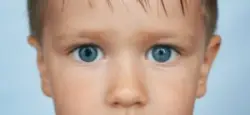
Generally, anisocoria is not serious on its own. While there is not a firm number on how common the condition is, historical studies shared by the National Center for Biotechnology Information (NCBI), 15 to 30 percent of the population may experience this condition. Most live with it without issue. Anisocoria is serious, however, when it is a part of another condition or a symptom of another condition.
Anisocoria is a difference in the dilation of the pupils, giving the affected person an observable difference in pupillary size. The eye with the smaller pupil is the ptotic eye, which dilates inappropriately.
Understanding Anisocoria and Dilation Lag
The word “anisocoria” refers to having a difference in pupil size. This occurs as a result of dilation lag. Anisocoria occurs more significantly in the dark. When a light is turned off, the affected pupil takes longer to dilate, leaving the person with pupils of different sizes.
The difference is enough to be medically significant. While this is not usually a problem, it may make it more difficult to focus and see out of that eye, especially in the dark.
Anisocoria may occur from birth or at any age. It may go undiagnosed unless noticed by an ophthalmologist during an eye exam, or when it occurs in conjunction with other symptoms.
"If your child was born with a birth injury, or cerebral palsy, we can help."
Anisocoria Can Be a Symptom of More Serious Conditions
Anisocoria is serious only when it is a symptom of another, much more serious condition. Horner’s syndrome is one condition often linked to anisocoria. If your child has anisocoria, it may be a part of a larger collection of symptoms that point to an injury in a specific area of the brain, or the nerves that connect that area of the brain to the eye and face on that side. In addition to anisocoria, other symptoms of Horner’s syndrome include:
- Ptosis, a characteristic drooping of the upper eyelid.
- An appearance that the eye has sunk into the face.
- Anhidrosis, a decrease in sweating ability on one side of the face.
Horner’s syndrome can occur in anyone at any age if they suffer an injury to the nerve pathways or the area of the brain that controls that particular side of the face. However, it is common in babies who suffered injuries before, during, or just after birth. This is often a preventable birth injury and may occur as a result of the doctor’s negligence, or the negligence of another health care provider.
Horner’s Syndrome May Support a Birth Injury Malpractice Case
If there is evidence to prove your child suffered a preventable birth injury, you may be able to build a comprehensive case against the doctor or hospital and file a claim to recover damages. Working with an attorney who takes on birth injury cases in your state can make this process much easier. He or she can take steps on your child’s behalf, such as:
- Working to assign liability to the doctor or hospital that caused their injury.
- Navigating the malpractice laws in your state.
- Meeting the statute of limitations and other deadlines that apply.
- Obtaining medical records and other evidence.
- Identifying a medical expert to participate in your case.
- Getting the expert to review your records and verify that you have a viable case.
- Representing you throughout the claims process.
Since each state has different medical malpractice laws, it is important that your birth injury attorney understands the rules in place there. This may include a number of statutory rules such as the statute of limitations, tolling this limit, and the statute of repose.
There may also be specific evidence required to pursue your claim, or a certain process you need to follow to file your claim. Your attorney should be able to navigate this system without putting additional stress or worry on your family.
"We know first-hand what you are going through."
Speak with a Member of a Birth Injury Law Firm Today About Your Case
You can get help with your child’s Horner’s syndrome birth injury case today by reaching out to the Birth Injury Lawyers Group. We know how Horner’s syndrome can affect your child and recognize the expenses and losses you suffered and may suffer in the future as a result of your child’s birth injury. Let our team support your family through this trying time.
Call (800) 222-9529 today for a free review of your case with someone who understands the laws in your state. We can evaluate your case to determine if you may be able to hold the doctor, hospital, or another liable party responsible and pursue damages. If so, you can take the first steps to get started building your case for compensation today.
"We are committed to helping families who have suffered medical negligence."

